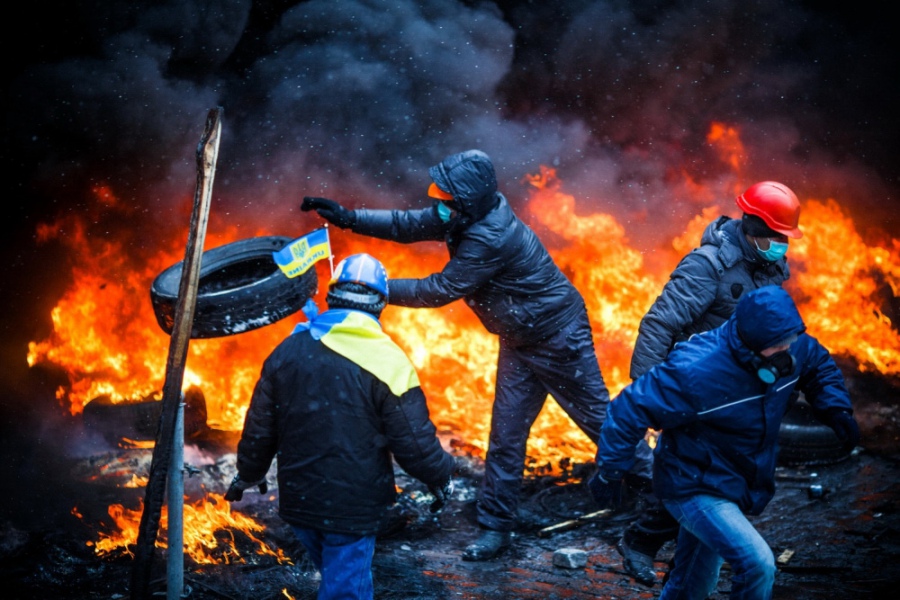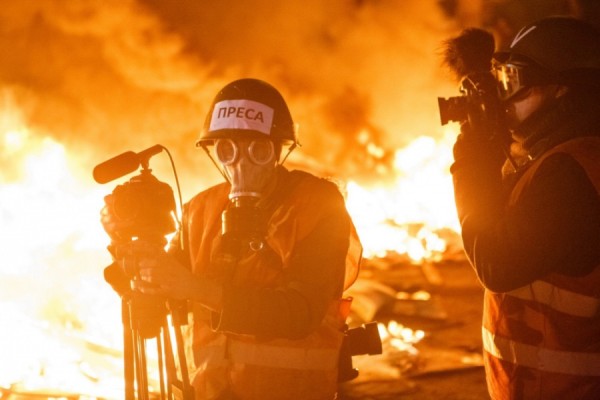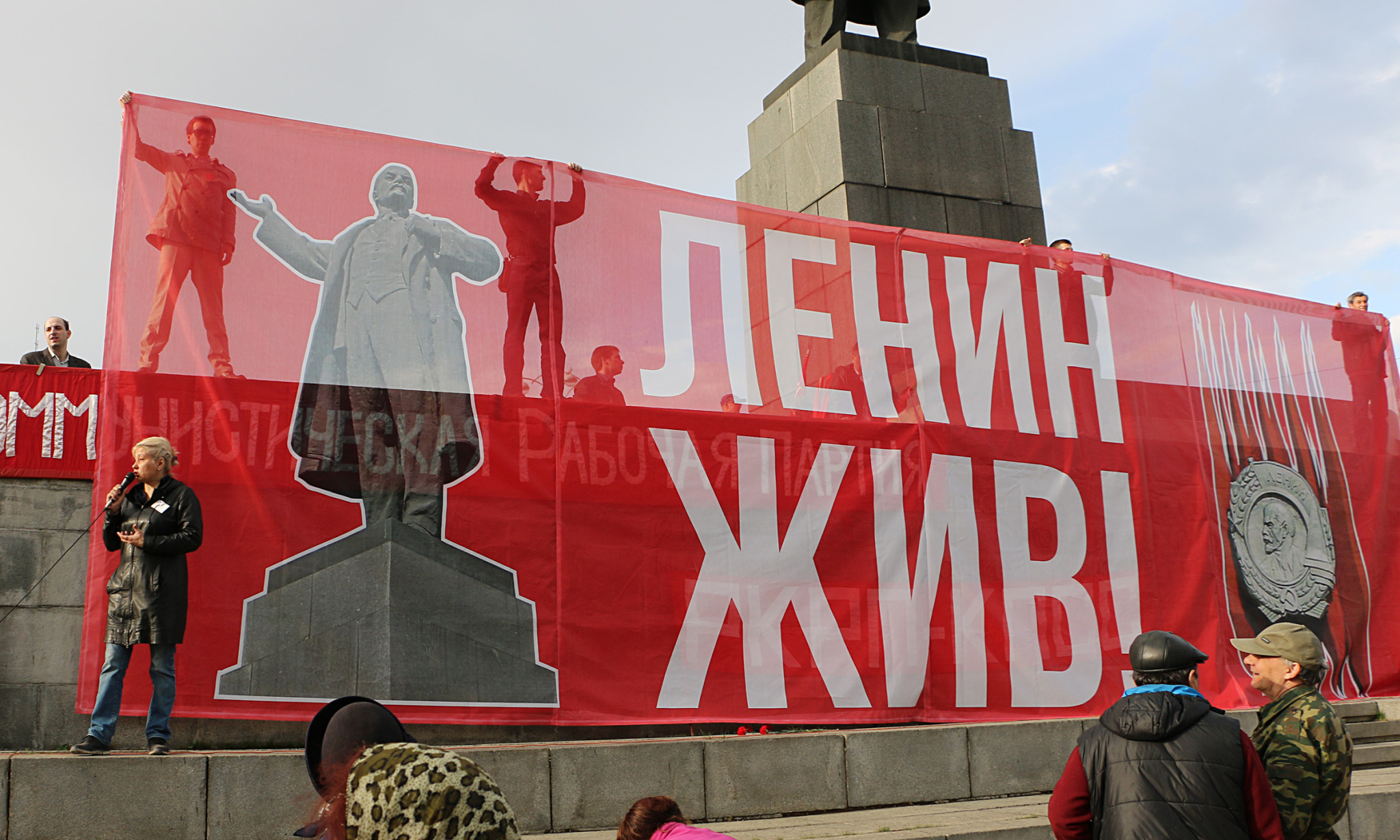Four years after the bloodiest days of Euromaidan, the events of winter 2013-2014, it is clearer than ever that Euromaidan is not only a point in the history of the past but a continuum which bears its impact in both the present and the future.
In 2015 three friends and colleagues conceived a Special Issue of academic articles “Civil Society in Ukraine: Building on Euromaidan Legacy.” Our aim was to provide at least a partial assessment of the change which the protagonist of the Euromaidan events – Ukraine’s civil society – has undergone since. An edited volume appeared in 2017 in Kyiv Mohyla Law and Politics Journal. We briefly address the wider scope of the studied tendencies, with a closer focus on each contribution to the volume, below, while the full version of the articles can be found on the journal website in open access.
Civil society in Ukraine: the research puzzle

Claims about the weakness and, hence, the impotence of civil society in Eastern Europe form a red line in the scholarship on the role of civil society in the democratization of post-communist Central and Eastern Europe. In Ukraine’s case, the puzzle of “weak” civil society has been challenged by the reality of the “three Maidans” or “three Revolutions”:
All of these were essentially grass-roots initiatives. However, the aftermaths of the Revolution on the Granite and the Orange Revolution have demonstrated that, while Ukrainians indeed proved to have the capacity to gather and protest when no one within the country or abroad expected them to, “the democratic movements rather appear[ed] to have been democratic moments” (emphasis added), with corrupt regimes reinstating themselves shortly after.
Thus, a number of scholars questioned Ukrainian civil society’s ability “to finish a revolution” beyond gathering in squares, proclaiming manifestos and even overthrowing dictators in the absence of an agenda on what to do next.
The articles in the Special Issue contribute to the debate on the strength of civil society in Ukraine. The contribution by Susann Worschech (European University Viadrina, Germany) examines key characteristics of post-Euromaidan civil society in Ukraine and finds that, while historically indeed characterized by high mobilization and low institutionalization, civil society in Ukraine has adjusted to new demands and challenges and has managed to build and broaden trust networks to a formerly unknown extent (read short version here).A number of scholars questioned Ukrainian civil society’s ability “to finish a revolution” beyond gathering in squares, proclaiming manifestos and even overthrowing dictators in the absence of an agenda on what to do next.
Zooming in on the narrow civil society cluster of Ukrainian think tanks and think tankers, Vera Axyonova (Justus Liebig University Gießen, Germany) and Diano Zubko (independent researcher, Ukraine) sketch out the Ukrainian think tank community before and after the Euromaidan and argue that it has become progressively more professionalized and independent in their agenda.
Thus, democratic socialization and increasing social capital appear to be main functions of civil society in Ukraine, while the function of civil society as a watchdog of the democratic rule does appear rather weak. To quote Oksana Udovyk, “Ukraine displays a unique mix of enthusiasm, creativity, conflict trauma, radicalism, and disappointment with the state. It is possible to describe this society in many different ways, but not as weak.”
Civil society in Ukraine: civil, uncivil, or both?

While Euromaidan erased many dividing lines in Ukrainian society, with people of different ethnic, linguistic, religious and economic background standing by each others’ side during the Revolution of Dignity, it also created new ones, related to the hybrid conflict in the East, internally displaced persons (IDPs)б and radicalization of Ukraine’s society around various issues of war and peace. The use of violence during and after Euromaidan is a prominent, yet sensitive and so far under-researched topic, starting with burning tires and Molotov cocktails as the symbols of the protests during the Euromaidan, to violence in Kyiv and Eastern and Southern cities of Ukraine committed by activists of Anti-Maidan, to the phenomenon of voluntary battalions and radical groups who could play the ambiguous roles of Ukraine’s sovereignty and territorial integrity defenders and human righter violators at the same time.
In the context of ongoing armed conflict and the weakness of state structures in Ukraine, nationalist, radical and violent groups contribute to the deepening of political divisions and create obstacles for lasting peace solutions.
In her contribution to this Special Issue, Maryna Shevtsova (Institute for Euro-Atlantic Cooperation, Ukraine) demonstrates that, while LGBT groups chose to “lay low” during the Euromaidan protests in order to avoid confrontation with the right-wing segment of the protesters and so avoid undermining the general cause, they did adopt more confident and visible strategies of political engagement and activism in the post-Euromaidan period.
Tatiana Kyselova (National University of Kyiv-Mohyla Academy, Ukraine) examines mediation and dialogue facilitation in Ukraine as alternatives to a corrupt system of justice, the culture of patronage and violence as a means of conflict resolution. She notes that, in the context of current conflict, the wider civil society in Ukraine remains divided between discourses of peace and reconciliation, on the one hand, and patriotism and fight against Russian aggression, on the other hand. Occasional clashes between the two demonstrate a potentially destructive trend that needs urgent attention of researchers and policy-makers.
The subject of dialogue and reconciliation is further examined in the contribution to this Special Issue by Ganna Bazilo (independent researcher in European Studies, Ukraine) and Giselle Bosse (Maastricht University & College of Europe). Having studied and compared bottom-up and top-down narratives of the conflict in Ukraine, they find that the two differ substantially. Whereas top-down narratives of the conflict by states and international organizations tend to reconfirm the status quo or the (neo-)liberal economic approach to peace, bottom-up narratives by local CSOs identify the lack of understanding between people as a key determinant affecting the conflict and emphasize the unity among communities, the deconstruction of negative images of the “other” and the rebuilding of empathy as the leading goals of dialogue and reconciliation.
State-society relations: cooperation, opposition, or substitution?

Ukraine’s civil society enjoys higher level of trust than any of Ukraine’s state institutions (in a survey conducted by the Kyiv International Institute of Sociology in December 2016, “volunteers” and “non-governmental organizations” (with a 53.5% and 37% support rate) gave way only to “church” (56.7%) and Ukrainian armed forces (53.1%)). As Laura Cleary put it, new volunteer initiatives, such as those helping the army and providing social services to the displaced and conflict-affected population, lead to “hybridization” of civil society because, in Ukraine, these civil society groups do not perform a watchdog function (holding government to account) but instead do the job for the state. What effect does this situation have on the state capacity?
Kateryna Zarembo (New Europe Center and National University of Kyiv-Mohyla Academy, Ukraine) argues in her contribution to this Special Issue that strong society can also undermine state capacity. Her study into the effects of volunteer participation on defense sector reform in Ukraine shows that volunteer organizations contributed to both strengthening the defense state capacities and weakening them. The volunteer movement filled in the crucial gap of basic provision and procurement for the army when the state was too weak, and it stepped away when the state regained its ability to perform its functions. However, weakening effects were also observed: by providing services more efficiently than the state, volunteer organizations induced the military to rely on them rather than demand the state to change its practices (read a short version here).
In a study of regional governors’ approaches to fostering inclusive political institutions in post-Euromaidan Donbas, Valentyna Romanova (National University of Kyiv-Mohyla Academy & “New Ukraine” Institute, Ukraine) examines how appointing a civil society activist who used to help the Ukrainian army during the security operation in Donbas to a position of regional executive in Luhansk oblast has affected regional governors’ approaches to state capacity (as control over the contact line) and power distribution (as holding democratic elections). She finds that this move caused variation in the approaches towards control over the contact line, but not towards holding democratic elections.

In turn, the contribution by Halyna Budivska and Dariya Orlova (both at National University of Kyiv-Mohyla Academy, Ukraine) examines the balancing and blurring between professionalism and activism in Ukrainian journalism post-Euromaidan. The authors expose and conceptualize the difficulty for Ukrainian journalists to choose and stay within the limits of one’s role – either as a (professional) journalist or as a (civic or political) activist – in the context of the Euromaidan and later in the face of an armed conflict. Given the various and even worrisome trends of the recent years, including closing of space for civil society as observed by Civicus monitor, the transformation, role, and impact of civil society in Ukraine will remain an issue of concern.
Natalia Shapovalova, Carnegie Endowment for International Peace
Kateryna Zarembo, New Europe Center and National University of Kyiv-Mohyla Academy, Ukraine
More from this series:
- When will the civic activity in Ukraine lead to political change?
- How volunteers both strengthened and weakened the Ukrainian state after Euromaidan



